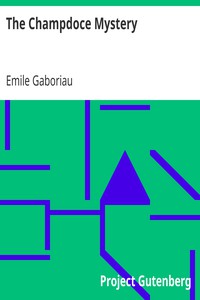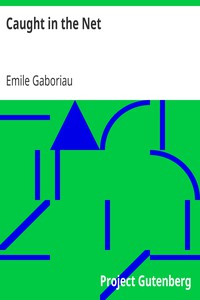The Champdoce Mystery, Emile Gaboriau [ebooks that read to you .TXT] 📗

- Author: Emile Gaboriau
Book online «The Champdoce Mystery, Emile Gaboriau [ebooks that read to you .TXT] 📗». Author Emile Gaboriau
“Ah,” murmured he, scarcely knowing the meaning of the words he uttered, “I had every confidence in you, and you have forgotten me.”
“You do not believe the words you have just spoken,” returned the Duchess haughtily; “but,” she added in softer accents, “what could I do? I may have been weak in obeying my father, but for all that I have never forgotten the past.”
Madame de Mussidan, who had stationed herself behind the closed door, caught every word, and a gleam of diabolical triumph flashed from her eyes. She felt sure that an interview which began in this manner would be certain to be repeated, and she was not in error. She soon saw that by some tacit understanding the Duchess and George contrived to meet constantly at her house, and this she carefully abstained from noticing. Things were working exactly as she desired and she waited, for she could well afford to do so, knowing that the impending crash could not long be delayed.
CHAPTER XV. A STAB IN THE DARK.
September had now arrived; and though the weather was very bad, the Duke de Champdoce, accompanied by his faithful old servant, Jean, left Paris on a visit to his training stables. Having had a serious difference with Diana, he had made up his mind to try whether a long absence on his part would not have the effect of reducing her to submission, and at the same time remembering the proverb, that “absence makes the heart grow fonder.”
He had already been away two whole days, and was growing extremely anxious at not having heard from Madame de Mussidan, when one evening, as he was returning from a late inspection of his stud, he was informed that there was a man waiting to see him. The man was a poor old fellow belonging to the place, who eked out a wretched subsistence by begging, and executing occasional commissions.
“Do you want me?” asked the Duke.
With a sly look, the man drew from his pocket a letter.
“This is for you,” muttered he.
“All right; give it to me, then.”
“I was told to give it to you only in private.”
“Never mind that; hand it over.”
“Well, if I must, I must.”
Norbert’s sole thought was that this letter must have come from Diana, and throwing the man a coin, hurried to a spot where it was light enough to read the missive. He did not, however, recognize Diana’s firm, bold hand on the envelope.
“Who the devil can this be from?” thought Norbert, as he tore open the outer covering. The paper within was soiled and greasy, and the handwriting was of the vilest description, it was full of bad spelling, and ran thus:—
“Sir,—
“I hardly dare tell you the truth, and yet my conscience will give me no relief until I do so. I can no longer bear to see a gentleman such as you are deceived by a woman who has no heart or honorable feeling. Your wife is unfaithful to you, and will soon make you a laughing stock to all. You may trust to this being true, for I am a respectable woman, and you can easily find out if I am lying to you. Hide yourself this evening, so that you may command a view of the side-door in the wall of your garden, and between half-past ten and eleven you will see your wife’s lover enter. It is a long time since he has been furnished with a key. The hour for the meeting has been judiciously fixed, for all the servants will be out; but I implore you not to be violent, for I would not do your wife any harm, but I feel that you ought to be warned.
“From one
“WHO KNOWS.”
Norbert ran through the contents of this infamous anonymous letter in an instant. The blood surged madly through his brain, and he uttered a howl of fury. His servants ran in to see what was the matter.
“Where is the fellow who brought this letter?” said he. “Run after him and bring him back to me.”
In a few minutes the sturdy grooms made their appearance, pushing in the messenger, who seemed over-powered with tears.
“I am not a thief,” exclaimed he. “It was given to me, but I will give it back.”
He was alluding to the louis given to him by Norbert, for the largeness of the sum made him think that the donor had made a mistake.
“Keep the money,” said the Duke; “I meant it for you; but tell me who gave this letter to you.”
“I can’t tell you,” answered the man. “If I ever saw him before, may my next glass of wine choke me. He got out of a cab just as I was passing near the bridge, and calling to me, said, ‘Look at this letter; at half-past seven take it to the Duke de Champdoce, who lives by his stables in the road to the Forest. Do you know the place?’ ‘Yes,’ I says, and then he slips the letter and a five-franc piece into my hand, got back into the cab, and off he went.”
“What was the man like?” asked he.
“Well, I can hardly say. He wasn’t young or old, or short or tall. I recollect he had a gold watch-chain on, but that was about all I noticed.”
“Very well; you can be off.”
At this moment Norbert’s anger was turned against the writer of the letter only, for he did not place the smallest credence in the accusations against his wife. If he did not love her, he at any rate respected her. “My wife,” said he to himself, “is an honorable and virtuous woman, and it is some discharged menial who has taken this cowardly mode of revenge.” A closer inspection of the letter seemed to show him that the faults in caligraphy were intentional. The concluding portion of the letter excited his attention, and, calling Jean, he asked him if it was true that all the servants would be absent from the house to-day.
“There will be none there this evening; not until late at night,” answered the old man.
“And why, pray?”
“Have you forgotten, your Grace, that





Comments (0)